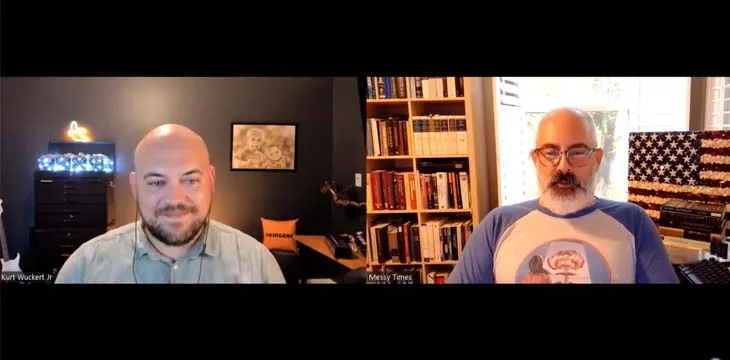|
Getting your Trinity Audio player ready...
|
CoinGeek’s Kurt Wuckert Jr. recently joined Christopher Messina on the Messy Times podcast to discuss Bitcoin’s history, why big blocks are the way, and what Bitcoin SV is.
Introducing Kurt Wuckert Jr.
Wuckert begins by explaining his Bitcoin journey. Back in 2012, he received $100 worth of Bitcoin from a client from a print job. After hearing about it a couple more times, he went down the rabbit hole and had a small mining operation by the end of 2013. Shortly thereafter, he started going to Bitcoin meetups. Chicago had plenty of them at the time, and he says he “fell in love with Bitcoin.” He liked the hard money aspect and recalled that most people were interested in that element of it. However, after Mt. Gox collapsed, it became a “weird scarcity cult” and started focusing on investing in Bitcoin rather than using it as a business tool.
Wuckert made up his mind early about big blocks, believing that block sizes should be decided by economic demand. In 2015, he got married and took a break from Bitcoin. Before he knew it, 2017 was in full swing; Ethereum was popular, ICOs were booming, and Bitcoin went on a bull run. He decided to do a Facebook livestream to answer the questions his friends had. This became a weekly broadcast about Bitcoin, which has been ongoing.
The Bitcoin civil war and subsequent split
Wuckert reflects the rhetoric during the block size wars. He describes it as “ridiculous,” recalling threats, DDoS attacks, people saying big blockers were the corporate takeover of Bitcoin, and the censorship of opinions that advocated for big blocks.
All of this eventually led to the split that saw BTC Core and BCH go separate ways. Wuckert rightly says that SegWit backers tried to change the definition of Bitcoin, which Satoshi defined as an unbroken chain of digital signatures.
Later, Wuckert realized that venture capitalists had funded both sides of this fight and felt like he’d been caught in the middle. This led him to discover companies like Digital Currency Group. He says that this civil war got the heart of what Bitcoin is. For him, Bitcoin is a consistent rules enforcement framework, and if it isn’t that, then it’s nothing at all.
Messina asks how big blockers will defeat small blockers. Wuckert explains that it’s extremely difficult; the rhetoric around BTC is enticing, and then those who buy in are rewarded monetarily. He likens himself to a preacher calling on people to repent, and nobody wants to listen because they’re too busy partying.
Author’s note: if you want to understand more about why big blocks will inevitably defeat small blocks, read this excellent post by Zeming Gao.
Who’s winning and losing economically today?
Wuckert starts to answer this by asking: If cancer could be solved for a $1 pill, how likely is it that it would make it to the market? He doesn’t think it’s likely as a big firm would buy up the patents and shelve them. He says that Bitcoin is like that; it will completely make Mastercard, Visa, and other major players obsolete, so they quickly figured out how to change it and render it harmless.
If this sounds like a conspiracy theory, Wuckert reminds us that to confirm this, all one has to do is look at who’s funding things in the Bitcoin space. Most major companies in the industries are in the portfolios of Mastercard and similar VC incubators. This way, the trusted third parties have reinserted themselves.
On top of this, BTC has deprecated features in the name of security. The narrative has changed so that all that matters are secure, unstoppable, large transactions. On which Wuckert questions who would need those, hinting at the nefarious players who have been linked to BTC on many occasions.
What is BSV?
Messina wants to know more about BSV and what it is. He asks Wuckert for the lowdown.
Wuckert explains that BSVers took what Satoshi said about Bitcoin, such as that Bitcoin could outcompete Visa before it was even released, and are interested in exploring these ideas to see if Satoshi was right.
He tells Messina about how Satoshi left Gavin Andresen in charge. He subsequently invited five people in and formed a sort of committee, but he quickly lost control, and the project was hijacked, chopping out many features and replacing Satoshi’s ideas with new ones.
Talking more about Satoshi, Wuckert says it is clear that Dr. Craig Wright is him. While he personally believes some others did the nuts and bolts work, such as coding, it’s 100% obvious that Dr. Wright is the architect. One of the main reasons Wuckert believes him is his knowledge of Bitcoin and how he gives in-depth explanations for things others don’t know about, such as the one-return feature.
Messina recalls a recent discussion with Dr. Wright in which he argued that there can only be one blockchain, just as there’s only one internet, and he likes how he is against the gatekeepers and rent-seekers. To him, Wright’s arguments make a huge amount of sense.
Tokenization on Bitcoin
Touching briefly on the concept of tokenization on Bitcoin, Messina asks if it’s correct to say big blocks enable tokenization whereas small blocks don’t.
Wuckert says that’s not exactly true, and you can create limited tokens on BTC. However, you can create almost any sort of token on BSV. He explains that you can even lock up a single satoshi in a smart contract and fractionalize it, effectively creating infinite tokens and ensuring there are always enough satoshi units to serve any purpose.
Watch the BSV Global Blockchain Convention Dubai 2022 Day 1 here:
https://www.youtube.com/watch?v=ggbZ8YedpBE
Watch the BSV Global Blockchain Convention Dubai 2022 Day 2 here:
https://www.youtube.com/watch?v=RzJsCRb6zt8
Watch the BSV Global Blockchain Convention Dubai 2022 Day 3 here:
https://www.youtube.com/watch?v=RzSCrXf1Ywc

 07-09-2025
07-09-2025 





